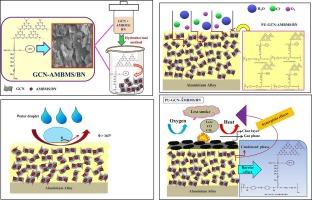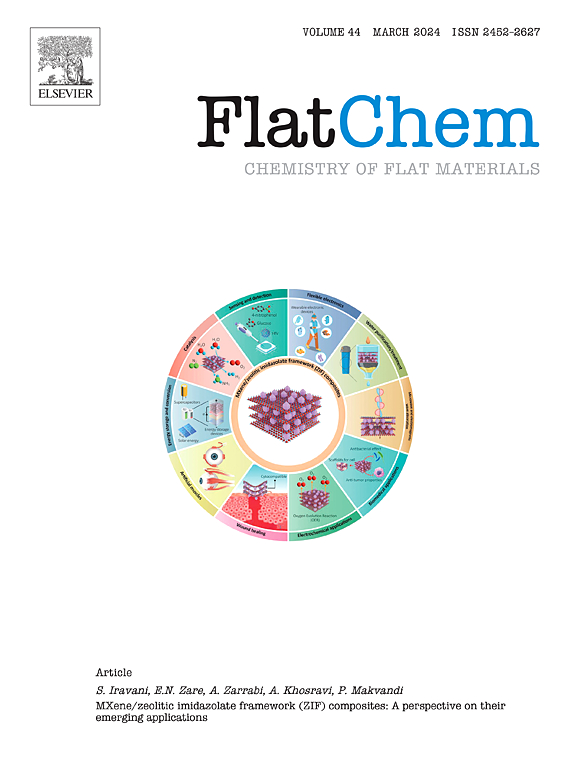A high-performance boron nitride nanocomposite coating with enhanced anticorrosion and flame retardant properties for aerospace applications
IF 6.2
3区 材料科学
Q2 CHEMISTRY, PHYSICAL
引用次数: 0
Abstract
The efficiency of impermeable, two-dimensional material-infused nanocomposites in preventing metal corrosion is becoming more widely acknowledged. The remarkable chemical and thermal durability of 3-(2-aminomethylamino)butyltrimethoxysilane (AMBMS)-functionalized hexagonal boron nitride (BN) sets it apart from others. This study looks into adding more graphitic carbon nitride (GCN) and functionalized BN to the polymer to make it more resistant to corrosion and fire. Electrochemical methods were used on aluminum substrates to evaluate the performance of the proposed polyurethane (PU)/functionalized BN/GCN coating in a 3.5 wt% NaCl solution. After 800 h of exposure, Electrochemical Impedance Spectroscopy (EIS) indicated a coating resistance of 1.15 × 109 Ω.cm2, indicating significant increases in corrosion resistance. The protection efficiency of the composite coating was calculated to be 99.9 %. Furthermore, the coating exhibited an angle of contact with water of 163°, indicating its exceptional water repellency. The PU/functionalized BN/GCN composite had a much lower peak heat release rate than pure PU, which means it is better at keeping flames from spreading. These enhancements contribute to improved safety in potential applications. This durability is particularly important for aerospace applications, where long-term performance is critical. In short, the addition of functionalized BN/GCN to PU coatings significantly enhances the material’s mechanical, flame retardant, and corrosion resistance qualities, making it ideal for use in harsh environments such as aerospace.

具有更强防腐和阻燃性能的高性能氮化硼纳米复合涂层,可用于航空航天领域
不透水的二维材料注入纳米复合材料在防止金属腐蚀方面的功效正得到越来越广泛的认可。3-(2-氨基甲基氨基)丁基三甲氧基硅烷(AMBMS)功能化六方氮化硼(BN)具有卓越的化学和热耐久性,使其与众不同。本研究探讨在聚合物中添加更多石墨氮化碳(GCN)和功能化 BN,使其更耐腐蚀和防火。研究人员在铝基材上使用电化学方法评估了在 3.5 wt% 的氯化钠溶液中拟议的聚氨酯 (PU) / 功能化 BN/GCN 涂层的性能。暴露 800 小时后,电化学阻抗谱(EIS)显示涂层电阻为 1.15 × 109 Ω.cm2,表明耐腐蚀性显著提高。经计算,复合涂层的保护效率为 99.9%。此外,涂层与水的接触角为 163°,表明其具有优异的憎水性。聚氨酯/功能化 BN/GCN 复合材料的峰值热释放率远远低于纯聚氨酯,这意味着它能更好地防止火焰蔓延。这些改进有助于提高潜在应用的安全性。这种耐久性对于航空航天应用尤为重要,因为在这些应用中,长期性能至关重要。简而言之,在聚氨酯涂层中添加功能化 BN/GCN 可显著提高材料的机械、阻燃和耐腐蚀性能,使其成为在航空航天等恶劣环境中使用的理想材料。
本文章由计算机程序翻译,如有差异,请以英文原文为准。
求助全文
约1分钟内获得全文
求助全文
来源期刊

FlatChem
Multiple-
CiteScore
8.40
自引率
6.50%
发文量
104
审稿时长
26 days
期刊介绍:
FlatChem - Chemistry of Flat Materials, a new voice in the community, publishes original and significant, cutting-edge research related to the chemistry of graphene and related 2D & layered materials. The overall aim of the journal is to combine the chemistry and applications of these materials, where the submission of communications, full papers, and concepts should contain chemistry in a materials context, which can be both experimental and/or theoretical. In addition to original research articles, FlatChem also offers reviews, minireviews, highlights and perspectives on the future of this research area with the scientific leaders in fields related to Flat Materials. Topics of interest include, but are not limited to, the following: -Design, synthesis, applications and investigation of graphene, graphene related materials and other 2D & layered materials (for example Silicene, Germanene, Phosphorene, MXenes, Boron nitride, Transition metal dichalcogenides) -Characterization of these materials using all forms of spectroscopy and microscopy techniques -Chemical modification or functionalization and dispersion of these materials, as well as interactions with other materials -Exploring the surface chemistry of these materials for applications in: Sensors or detectors in electrochemical/Lab on a Chip devices, Composite materials, Membranes, Environment technology, Catalysis for energy storage and conversion (for example fuel cells, supercapacitors, batteries, hydrogen storage), Biomedical technology (drug delivery, biosensing, bioimaging)
 求助内容:
求助内容: 应助结果提醒方式:
应助结果提醒方式:


